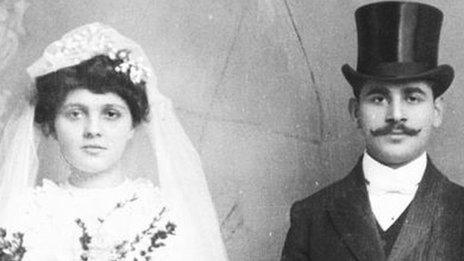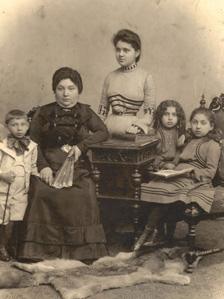A Point of View: A convert to family history
- Published
- comments

The discovery of a tape recording shed light on a puzzling family photograph which was taken in 1906 - and changed historian Lisa Jardine's views about the genealogy boom.
The campaign to promote more history in the school curriculum has been doing rather well lately. Historians and politicians seem to be agreed that more history will connect us all more closely to our island's past.
Recently, Prof David Cannadine published the results of a two-year research project investigating the place of history teaching in secondary schools, entitled The Right Kind of History.
Cannadine makes a strong case for compulsory history in the curriculum to the age of 16 - long enough for students to absorb the broad range of knowledge of the past always intended when the current syllabus was introduced under Sir Keith Joseph in the 1980s.
Two days later, Secretary of State for Education Michael Gove, addressing a conference on history in education in London, pronounced himself "an unashamed and unapologetic advocate for the central role of history in our curriculum".
As an historian myself, I am all for good history teaching at all levels, as part of an essential understanding of where we have come from and who we are.
But I have recently become converted to a more humble part of the exploration of the past, which is largely conducted beyond the boundaries of the academy.
Family history is an activity that has always had its passionate advocates, and has been stimulated further by the television series Who Do You Think You Are?, in which celebrities are helped by trained historians and archivists to trace their roots.
In recent years The National Archives at Kew has been dealing with increasing numbers of ordinary people looking for records relating to their own lives. Many archives now devote special resources to these users
For several years, my sister Judith has been researching the family history of the Flattos - my father's mother's family - inspired by the boxes of faded family photographs discovered among my parents' possessions, dating from the beginning of the 20th Century, and inscribed with locations ranging from Lodz in Poland to Kyverdale Road in London.
Her attempts to identify and connect the sitters in the photographs has led her deep into genealogy, and obliged her to learn about European history in the early decades of the 20th Century. She has journeyed intrepidly to the ends of the District and Metropolitan Tube lines, to Jewish cemeteries at East Ham, Rainham and Bushey, to read genealogical data off the family gravestones.
I confess that, as a professional historian, I did not always take her efforts seriously - in genealogy, so much depends on guesswork and surmise, so many of the documents defy interpretation. The outcome, I have tended to feel, is bound to be part romance, part sentimentality, the tale of impecunious wanderers, driven from their homes by persecution, then working their way up to respectability in Britain.
In one of our family boxes, for example, is a formal wedding photograph of my grandmother, Celie Flatto, barely in her 20s, with her new husband Abram Bronowski. Taken in 1906, it is stamped with the address of the photographer's studio: 436 Whitechapel Road, London.
But her eldest son, my father, was born in Lodz, Poland, in 1908. He did not arrive in London with his parents and two siblings until 1920. Nothing in the records explains why the couple were in London earlier nor why they had returned to Poland.
Tea and tales
Judith had scoured the census data, and called up all the relevant documents in The National Archives. Although all the other members of the family - her parents and siblings, her husband and children - had been naturalised some time in the 1920s and 30s, there was no naturalisation document for Grandma Celie. The marriage certificate Judith unearthed listed Abram's occupation as "professional singer" - we knew nothing about any singing.
Then, last summer, Judith telephoned me. She had discovered that two nieces of Grandma Celie were still alive and happy to meet us.
So in early October we went to tea with Ruth and Dorothy, sharp-as-mustard octogenarian daughters of Celie's much-younger sisters, Ada and Mary. Over biscuits and cups of tea they studied Judith's cache of photographs, casually identifying people she would never have been able to match to her family tree. "Oh look, that's me with my mother and Auntie Rose," and "There are my aunts, all dressed up to go out dancing."
I study the period 1500-1800. All those who play a part in the stories I endeavour to reconstruct are long dead. What a thrill, then, to encounter the miracle of oral history - of having a person in front of you who was actually there.
And then, out of the blue, Ruth recalled that 30 years ago, when her mother Ada - born in 1895, so then in her 90s - was living with her, she had sat her down and recorded several hours of reminiscences about her family. Perhaps she might be able to locate the cassette tapes and we might be interested in hearing them?
Train trouble
A week later, she emailed to say that she had located the tapes, and we were welcome to borrow them.
So it was that I was able to listen to four hours of a voice from the past recounting, with absolute clarity and lucidity, events of more than 100 years ago. Daughter Ruth is there too, firmly steering her mother back to the point, whenever she tends to digress - a tour-de-force in gentle interviewing guidance.
The tapes begin with the Flatto family - Ada (our narrator), her mother and three of her siblings, setting off in 1902 on the train from Lodz to join their brother Max in London. Max had left Poland to avoid conscription, and set up in haberdashery in Commercial Street.

The Flattos in 1902 (from left): Jack, Dvora, Celie, Ada and Mary
Somewhere in Germany, the seven-year-old Ada needed the toilet. She and her mother got down from the train at the next station. When they returned the train had gone. They waited for hours in the cold until finally the stationmaster put them on a train that took them to rejoin their family. Ada told the story as if it were yesterday - her mother's panic, the palpable relief when they boarded another train.
And here was the story of Celie and Abram, my paternal grandparents. The teenaged Celie had fallen for a handsome young cantor - singer in the synagogue - in Lodz and become engaged against her father's wishes.
The family had hoped that by taking her to London they would prevent the marriage. But Abram followed them, married Celie and, because he had no right to remain in Britain, returned with her to Lodz. Ada remembered visiting them and their new baby as a 13-year-old, with her mother, in 1908, the year my father was born.
We also learned why Celie and Abram had moved, first from Lodz to Plauen in Germany, and then to London.
"Mother found out," recounts Ada, "that Celie and Abram and their baby were struggling. Singing was all that Abram knew - he had a marvellous voice - but they could barely make ends meet."
In London, the Flattos were doing well in the lace and embroidery business. So Ada's mother made up a big bundle of lace and sent it to Celie and Abram to set up in haberdashery in Poland.
Then in 1910, great-grandfather decided to start importing machine lace from Plauen, which had become its centre of production. My grandparents became the German end of the Flattos' import-export business, and there their two younger children were born.
World War I put an end to Anglo-German import-export. On the tapes, Great-Aunt Ada explains that the London family had no communication with my grandparents until the Armistice, by which time Germany was in revolutionary turmoil and my father's family was living in poverty.
My father recalled soldiers in the streets, and in a poem written in the 1930s describes himself as "starving in Sudetenland".
Thus it was that he and his family arrived in London with little more than the clothes they stood up in in 1920. The absence of naturalisation records for Celie is probably explained by the fact that one set of authorities assumed she had been naturalised with her parents, the other that she had been naturalised with her husband and children.
The strong voice of Great-Aunt Ada has completely converted me to family history. She has put together the pieces of the jigsaw puzzle and given me a real sense of inhabiting my own history as British.
We did not wash up on England's shores by chance. In dangerous, prejudiced times, Britain welcomed my family not once but twice as economic migrants.
Like anyone else who has begun to explore their roots, I am, of course, determined to find out more. I will certainly never be disparaging about family history again.